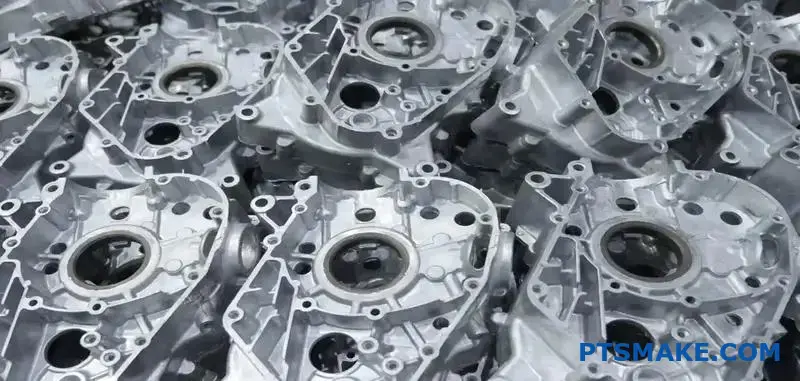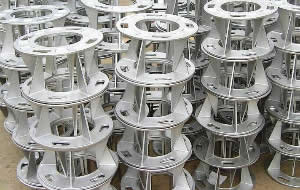How aluminum casting ensures strength in metal fabrication
Wiki Article
The Future of Aluminum Foundries: Patterns and Innovations Shaping the Industry
The aluminum foundry sector is undertaking substantial transformation. Secret fads highlight the value of sustainability and efficiency. Innovations in smart manufacturing and automation are becoming common. Shops are significantly concentrated on making use of recycled products. This shift increases concerns about future techniques and innovations. Exactly how will these modifications influence production approaches and market dynamics? The answers might redefine the industry landscape in unforeseen means.Innovations in Smart Production Technologies
As the aluminum factory market develops, advancements in smart production technologies are coming to be increasingly necessary for improving efficiency and effectiveness. The combination of automation, expert system, and the Internet of Things (IoT) is transforming standard foundry operations. These innovations allow real-time monitoring of procedures, permitting prompt changes that optimize result and reduce waste.Furthermore, artificial intelligence formulas examine manufacturing information to identify patterns and predict maintenance needs, minimizing downtime. Robotics are significantly employed for repetitive jobs, releasing skilled employees to concentrate on more intricate challenges. Furthermore, electronic doubles-- digital designs of physical processes-- facilitate simulations that can improve layout and operational approaches.
The adoption of these smart production innovations is driving competitive benefits in the aluminum shop market. By streamlining process and enhancing decision-making capabilities, foundries can fulfill growing market needs while keeping high-quality standards. The future of light weight aluminum foundries is without a doubt connected to these technical developments.
Welcoming Eco-Friendly Materials and Processes
The aluminum foundry sector is progressively concentrating on environment-friendly materials and processes to improve sustainability. This shift includes the adoption of sustainable material sourcing, energy-efficient production strategies, and effective recycling and waste monitoring approaches. By integrating these techniques, shops aim to lower their ecological impact while keeping competitiveness in the marketplace.Lasting Material Sourcing
How can aluminum factories improve their sustainability initiatives? Sustainable material sourcing has actually emerged as an essential technique in accomplishing this goal. By prioritizing recycled light weight aluminum, foundries can substantially reduce their ecological impact, as recycled products need much less power and fewer resources compared to main aluminum production. In addition, sourcing materials from accredited vendors that stick to eco-friendly techniques advertises responsible mining and lessens eco-friendly influence. Shops are also checking out alternate materials, such as biopolymers and environmentally friendly finishings, to complement standard aluminum procedures. Collaborating with stakeholders, consisting of providers and environmental organizations, fosters development in sourcing strategies. Eventually, accepting lasting material sourcing not only straightens with global sustainability objectives yet also settings aluminum shops as leaders in eco accountable production.Energy-Efficient Manufacturing Techniques
Aluminum foundries are progressively adopting energy-efficient manufacturing strategies to complement their sustainable product sourcing initiatives. These techniques concentrate on reducing power intake throughout the manufacturing process. Advanced modern technologies, such as induction melting and optimized casting processes, are being executed to minimize the total carbon footprint. Furthermore, automation and wise manufacturing systems enhance operational efficiency, permitting better energy monitoring. Shops are likewise exploring the integration of sustainable power sources, such as solar and wind, to power their operations. By prioritizing energy efficiency, aluminum foundries not just lower manufacturing costs however additionally align themselves with worldwide sustainability goals, making certain a much more eco liable approach to light weight aluminum production while satisfying the climbing need for green methods in the sector.Reusing and Waste Management
Accepting environment-friendly materials and procedures, light weight aluminum foundries are prioritizing recycling and waste administration methods to improve sustainability in their procedures. By integrating closed-loop systems, these centers are lessening waste and maximizing resource efficiency. Scrap light weight aluminum, a readily offered material, is being reused on-site, greatly minimizing the need for virgin materials and lowering power usage. Innovations in arranging and processing modern technologies better assist in the recycling of aluminum, making certain that also infected products can be repurposed successfully. Furthermore, factories are embracing sustainable methods such as lowering hazardous waste and advertising the usage of eco-friendly products for product packaging. This commitment to recycling not just reduces ecological effect but also boosts the financial viability of light weight aluminum shops in an open market.The Role of Automation and Robotics
Automation and robotics are progressively transforming the aluminum foundry industry, significantly enhancing manufacturing effectiveness. By incorporating sophisticated technologies, shops can reduce labor prices while simultaneously boosting safety and security standards for their labor force. This shift not just enhances operations yet additionally positions the sector for sustainable growth in an affordable market.Boosted Manufacturing Performance
Revolutionizing production processes, the assimilation of innovative robotics and automation modern technologies has actually come to be a foundation for aluminum shops looking for improved efficiency. These innovations improve operations, lower cycle times, and improve product top quality by lessening human mistake. Automated systems can check assembly line in real-time, permitting instant modifications that maximize outcome. Furthermore, robotics facilitate the handling of harmful materials, guaranteeing much safer functioning atmospheres while increasing throughput. Predictive upkeep technologies likewise add to effectiveness by expecting devices failures, thus reducing downtime. Because of this, light weight aluminum foundries can accomplish higher consistency in their items while reacting much more quickly to market needs. This accept of automation is establishing a brand-new criterion for performance and operational why not try here excellence within the sector.
Reducing Labor Prices
The change in the direction of advanced robotics and automation in light weight aluminum shops not only boosts manufacturing efficiency click here for more however additionally plays a significant duty in lowering labor prices. By incorporating automated systems, foundries can decrease the dependence on manual work, which often entails high earnings and training expenditures. Robotics enhance recurring jobs such as putting, molding, and ending up, permitting a greater output with fewer employees. This technological adjustment not just decreases labor-related expenses but also boosts uniformity and high quality in manufacturing. Automation can operate around the clock, taking full advantage of functional hours without the connected costs of overtime or shift differentials. As an outcome, aluminum shops can attain substantial financial savings while maintaining affordable pricing in a developing market landscape.Improving Security Requirements
While conventional light weight aluminum shop procedures commonly expose workers to hazardous settings, the integration of robotics and automation substantially enhances safety criteria within the market. Automated systems can perform high-risk jobs, such as molten metal handling and heavy training, decreasing human direct exposure to unsafe problems. Additionally, robotics can run in severe temperature levels and hazardous environments, successfully minimizing the threat of injury. Advanced checking modern technologies and artificial intelligence guarantee real-time safety assessments, permitting immediate reactions to prospective hazards. Automation enhances workflows, minimizing the chance of mishaps triggered by human error. Consequently, the fostering of these innovations not just enhances security but also cultivates an extra efficient and efficient working atmosphere in aluminum shops.Enhancing Energy Efficiency in Production
As light weight aluminum factories look for to keep competition in an advancing market, enhancing energy effectiveness in manufacturing has actually become a critical focus. By adopting advanced technologies such as high-efficiency melting heating systems and automated temperature level controls, factories can notably minimize energy consumption. Executing real-time tracking systems enables precise monitoring of power usage throughout the manufacturing procedure, allowing quick modifications to optimize performance.Furthermore, moving to alternate energy resources, consisting of renewable alternatives, can further lower the carbon footprint. The assimilation of power healing systems, which recover waste warmth for reuse, is coming to be significantly usual. Training workers in energy monitoring techniques ensures that everyone included in the production procedure is mindful of energy use.
These campaigns not just reduced operational prices however also straighten with international sustainability goals, positioning aluminum foundries as liable players in the market while enhancing their total competition. - Aluminum Foundry
Innovations in Recycling Light Weight Aluminum
Innovations in recycling aluminum have obtained energy together with efforts to click here for info enhance energy efficiency in production. The aluminum sector has welcomed sophisticated modern technologies that enhance the reusing procedure, lowering energy consumption and environmental influence. Strategies such as hydrometallurgy and new sorting technologies enhance the removal of aluminum from scrap, enhancing return prices and guaranteeing better recycled product.
Furthermore, the growth of closed-loop recycling systems enables factories to recycle aluminum without considerable degradation in top quality, making the procedure more sustainable. Developments in logistics and collection, consisting of enhanced tracking systems and automated sorting, have actually also played an important role in raising the efficiency of aluminum recuperation. These innovations not just add to a circular economic situation yet additionally aid minimize the carbon impact linked with light weight aluminum manufacturing. As the need for lasting techniques expands, these advancements place the aluminum foundry sector as a leader in responsible resource monitoring.
Replying To Market Demands and Consumer Trends
Versatility has become a keystone for light weight aluminum factories responding to developing market needs and consumer trends. As industries increasingly focus on sustainability, aluminum foundries are changing towards green practices, consisting of boosted recycling processes and lowered carbon impacts. This shift straightens with customer preferences for environmentally liable items, driving shops to innovate their offerings.In addition, the increase of light-weight materials in automotive and aerospace fields requires improvements in light weight aluminum alloys and casting techniques. Factories are purchasing research and growth to produce high-strength, light-weight components that satisfy strict performance requirements.
Modification has actually gained traction, with consumers seeking customized solutions. Aluminum foundries are leveraging advanced production modern technologies, such as 3D printing, to suit details customer demands efficiently. This responsiveness not just pleases customer needs but likewise placements aluminum shops competitively in a vibrant market landscape, guaranteeing their importance in an ever-changing industrial atmosphere.

Frequently Asked Questions
Exactly How Do Light Weight Aluminum Foundries Effect Resident Economies?
Aluminum factories significantly impact local economic climates by creating work, boosting need for regional providers, and adding to area development. Their operations typically result in enhanced tax incomes, which can fund necessary civil services and facilities improvements.What Are the Safety Rules for Aluminum Foundry Workers?
Safety and security laws for light weight aluminum foundry employees include compulsory personal safety tools, appropriate ventilation systems, regular training on dangerous products, and adherence to guidelines established by work-related health and wellness managements to reduce risks and warranty worker safety and security. - aluminum castingJust How Does Aluminum Recycling Affect Global Supply Chains?
Light weight aluminum recycling considerably minimizes need for resources, boosts resource performance, and supports prices. This change impacts global supply chains by cultivating a circular economic situation, advertising sustainability, and guaranteeing a more resistant market in fluctuating markets.What Job Opportunities Exist in the Aluminum Shop Industry?
Numerous occupation opportunities exist in the aluminum shop industry, consisting of roles in design, quality assurance, production administration, and r & d. Competent labor positions such as mold manufacturers and machine operators are likewise popular.Just How Do International Profession Policies Influence Aluminum Foundries?
International profession plans considerably influence aluminum factories by influencing import tolls, supply chain characteristics, and market gain access to. These elements can influence functional prices, competition, and total success within the global aluminum production landscape.By prioritizing recycled aluminum, shops can greatly minimize their ecological footprint, as recycled materials call for less energy and fewer sources contrasted to main light weight aluminum production. Aluminum shops are progressively taking on energy-efficient manufacturing strategies to enhance their sustainable material sourcing campaigns. Automation and robotics are significantly changing the light weight aluminum foundry industry, significantly improving production effectiveness. The change in the direction of advanced robotics and automation in aluminum factories not just improves production effectiveness yet also plays a considerable duty in minimizing labor costs. As light weight aluminum factories seek to keep competition in a developing market, boosting power effectiveness in manufacturing has arised as a vital focus.
Report this wiki page